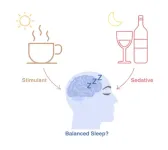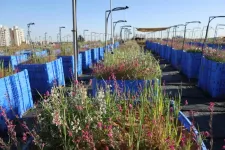(Press-News.org) A new analysis of lice genetic diversity suggests that lice came to the Americas twice – once during the first wave of human migration across the Bering Strait, and again during European colonization. Marina Ascunce, currently at the USDA-ARS, and colleagues, report these findings in a new study published November 8 in the open-access journal PLOS ONE.
The human louse is a wingless, blood-sucking parasite that lives its entire life on its host. It is one of the oldest known parasites to live on humans, and the two species have coevolved for millennia. Due to this intimate relationship, studying lice can offer clues to how humans evolved as well. In the new study, researchers analyzed the genetic variation in 274 human lice from 25 geographic sites around the world.
A genetic analysis based on louse DNA revealed the existence of two distinct clusters of lice that rarely interbred. Cluster I had a worldwide distribution, while cluster II was found in Europe and the Americas. The only lice with ancestry from both clusters are found in the Americas. This distinct group appears to be the result of a mixture between lice descended from populations that arrived with the First People and those descended from European lice, which were brought over during the colonization of the Americas.
The researchers also identified a genetic relationship between lice in Asia and Central America. This supports the idea that people from East Asia migrated to North America and became the first Native Americans. These people then spread south into Central America, where modern louse populations today still retain a genetic signature from their distant Asian ancestors.
The patterns observed in the new study support existing ideas about human migration and provide additional knowledge about how lice have evolved. The researchers point out that they selected genetic markers that evolve quickly and are best suited to recent events. Thus, future studies that use markers that have changed more slowly could shed light on more ancient events. Additionally, the methods developed for this work could guide the development of new analyses to study other host-parasite systems.
The authors add: “Human lice are more than annoying human parasites, they are ‘satellites’ of our evolution. Because human lice feed on human blood, they need us to survive, and over millions of years this resulted in a long co-evolutionary history together.”
#####
In your coverage please use this URL to provide access to the freely available article in PLOS ONE: https://journals.plos.org/plosone/article?id=10.1371/journal.pone.0293409
Citation: Ascunce MS, Toloza AC, González-Oliver A, Reed DL (2023) Nuclear genetic diversity of head lice sheds light on human dispersal around the world. PLoS ONE 18(11): e0293409. https://doi.org/10.1371/journal.pone.0293409
Author Countries: USA, Argentina, México
Funding: ACT is a researcher of the Consejo Nacional de Investigaciones Científicas y Técnica, Argentina (CONICET) and this study received partial financial support by CONICET PIP 2016-0198CO, PICT 2016-1111 and PICT-2019-01334 to ACT. AGO was partially sponsored by Consejo Nacional de Ciencia y Tecnología (CONACYT), México, Project CB 2015, no. 252130. This work was also partially funded by NSF grant DEB 1655600 to DLR. The funders had no role in study design, data collection and analysis, decision to publish, or preparation of the manuscript.
END
Head lice evolution mirrors human migration and colonization in the Americas
Global genetic study of lice suggests they arrived twice in the New World on human hosts
2023-11-08
ELSE PRESS RELEASES FROM THIS DATE:
A digital detox may not improve wellbeing: social media users who reduced their use for a week saw decreases in positive emotions as well as in negative ones
2023-11-08
A digital detox may not improve wellbeing: social media users who reduced their use for a week saw decreases in positive emotions as well as in negative ones
###
Article URL: https://journals.plos.org/plosone/article?id=10.1371/journal.pone.0293467
Article Title: Restricting social networking site use for one week produces varied effects on mood but does not increase explicit or implicit desires to use SNSs: Findings from an ecological momentary assessment study
Author Countries: UK
Funding: This work was supported by the Economic and Social Research ...
Financial traders may seek better sleep by self-medicating with caffeine and alcohol to balance the effects of the stimulant and the sedative, per micro-longitudinal study
2023-11-08
Financial traders may seek better sleep by self-medicating with caffeine and alcohol to balance the effects of the stimulant and the sedative, per micro-longitudinal study
###
Article URL: https://journals.plos.org/plosone/article?id=10.1371/journal.pone.0291675
Article Title: Sleep, alcohol, and caffeine in financial traders
Author Countries: USA
Funding: The authors received no specific funding for this work. END ...
Autism brain states hold the key to unlocking childhood memories
2023-11-08
Neuroscientists have discovered a fascinating connection between the retention of early life memories and brain developmental trajectories associated with autism [Wednesday 8th November 2023].
Most of us remember little of our experiences from before two years of age. This form of memory loss, termed “infantile amnesia” refers to the seemingly complete loss of episodic and autobiographical memories formed during early life. The research team at Trinity College Dublin investigated how infantile amnesia is affected by forms of autism.
The maternal immune response, sparked into life in response to infection during pregnancy, ...
Artificial bladders shine light on bugs that cause urinary tract infections
2023-11-08
The research, published today in Science Advances, is the first to use a sophisticated human tissue model to explore the interaction between host and pathogen for six common species that cause urinary tract infections. The findings suggest that the ‘one size fits all’ approach to diagnosis and treatment currently used in most healthcare systems is inadequate.
Urinary tract infection (UTI) is a growing problem, with around 400 million global cases per year and an estimated 250,000 UTI-related deaths associated with antimicrobial resistance ...
Temperature increase triggers the viral infection
2023-11-08
Researchers at Lund University, together with colleagues at the NIST Synchrotron Facility in the USA, have mapped on an atomic level what happens in a virus particle when the temperature is raised.
"When the temperature rises, the virus's genetic material changes its form and density, becoming more fluid-like, which leads to its rapid injection into the cell," says Alex Evilevitch a researcher at Lund University who led the study.
Viruses lack their own metabolism and the ability to replicate independently; they are entirely dependent on a host cell to multiply. Instead, the virus hijacks the internal machinery of the infected cell ...
Molecule tested at University of São Paulo, in Brazil, proves able to mitigate heart failure
2023-11-08
Researchers at the University of São Paulo (USP) in Brazil, partnering with Foresee Pharmaceuticals, a Taiwan and US-based biopharmaceutical company, have tested a synthetic molecule for the treatment of heart failure. The study, funded by FAPESP, was published yesterday (11/07/2023) in the European Heart Journal. The theme was also highlighted in the magazine's editorial.
Heart failure is a condition in which the heart muscle cannot pump enough blood to meet the body's needs for blood and oxygen. It causes more deaths worldwide than any other disease, in the sense that other cardiovascular disorders ...
How mice choose to eat or to drink
2023-11-08
Making decisions is hard. Even when we know what we want, our choice often leaves something else on the table. For a hungry mouse, every morsel counts. But what if the decision is more consequential than choosing between crumbs and cheese?
Stanford researchers investigated how mice resolve conflicts between basic needs in a study published in Nature on Nov. 8. They presented mice that were both hungry and thirsty with equal access to food and water and watched to see what happened next.
The behavior of the mice surprised the scientists. Some gravitated first ...
Plant lifecycle insights: Big data can predict climate change impact
2023-11-08
The study is based on a new database created by the researchers which combines, for the first time, datasets on distribution and datasets on lifecycles, making it possible to establish the prevalence of different lifecycles around the globe. It uses empirical tools and big data to examine theoretical paradigms about the way in which human disturbance is affecting annual plants and their global distribution. Among other things, it was found that annuals are expected to benefit more with the rise in human population density and due to climate change, which ...
Scientists one step closer to re-writing world’s first synthetic yeast genome, unravelling the fundamental building blocks of life
2023-11-08
Scientists have engineered a chromosome entirely from scratch that will contribute to the production of the world’s first synthetic yeast.
Researchers in the Manchester Institute of Biotechnology (MIB) at The University of Manchester have created the tRNA Neochromosome – a chromosome that is new to nature.
It forms part of a wider project (Sc2.0) that has now successfully synthesised all 16 native chromosomes in Saccharomyces cerevisiae, common baker’s yeast, and aims to combine ...
Scientists take major step towards completing the world’s first synthetic yeast.
2023-11-08
A UK-based team of Scientists, led by experts from the University of Nottingham and Imperial College London, have completed construction of a synthetic chromosome as part of a major international project to build the world’s first synthetic yeast genome.
The work, which is published in Cell Genomics, represents completion of one of the 16 chromosomes of the yeast genome by the UK team, which is part of the biggest project ever in synthetic biology; the international synthetic yeast genome collaboration.
The collaboration, known as 'Sc2.0' has been a 15-year project involving teams from around the world (UK, US, China, Singapore, UK, France and Australia), working together ...
LAST 30 PRESS RELEASES:
Machine learning tool can predict serious transplant complications months earlier
Prevalence of over-the-counter and prescription medication use in the US
US child mental health care need, unmet needs, and difficulty accessing services
Incidental rotator cuff abnormalities on magnetic resonance imaging
Sensing local fibers in pancreatic tumors, cancer cells ‘choose’ to either grow or tolerate treatment
Barriers to mental health care leave many children behind, new data cautions
Cancer and inflammation: immunologic interplay, translational advances, and clinical strategies
Bioactive polyphenolic compounds and in vitro anti-degenerative property-based pharmacological propensities of some promising germplasms of Amaranthus hypochondriacus L.
AI-powered companionship: PolyU interfaculty scholar harnesses music and empathetic speech in robots to combat loneliness
Antarctica sits above Earth’s strongest “gravity hole.” Now we know how it got that way
Haircare products made with botanicals protects strands, adds shine
Enhanced pulmonary nodule detection and classification using artificial intelligence on LIDC-IDRI data
Using NBA, study finds that pay differences among top performers can erode cooperation
Korea University, Stanford University, and IESGA launch Water Sustainability Index to combat ESG greenwashing
Molecular glue discovery: large scale instead of lucky strike
Insulin resistance predictor highlights cancer connection
Explaining next-generation solar cells
Slippery ions create a smoother path to blue energy
Magnetic resonance imaging opens the door to better treatments for underdiagnosed atypical Parkinsonisms
National poll finds gaps in community preparedness for teen cardiac emergencies
One strategy to block both drug-resistant bacteria and influenza: new broad-spectrum infection prevention approach validated
Survey: 3 in 4 skip physical therapy homework, stunting progress
College students who spend hours on social media are more likely to be lonely – national US study
Evidence behind intermittent fasting for weight loss fails to match hype
How AI tools like DeepSeek are transforming emotional and mental health care of Chinese youth
Study finds link between sugary drinks and anxiety in young people
Scientists show how to predict world’s deadly scorpion hotspots
ASU researchers to lead AAAS panel on water insecurity in the United States
ASU professor Anne Stone to present at AAAS Conference in Phoenix on ancient origins of modern disease
Proposals for exploring viruses and skin as the next experimental quantum frontiers share US$30,000 science award
[Press-News.org] Head lice evolution mirrors human migration and colonization in the AmericasGlobal genetic study of lice suggests they arrived twice in the New World on human hosts





